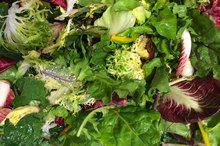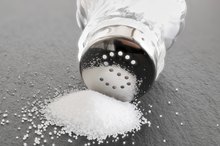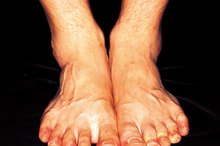What does fact checked mean?
At Healthfully, we strive to deliver objective content that is accurate and up-to-date. Our team periodically reviews articles in order to ensure content quality. The sources cited below consist of evidence from peer-reviewed journals, prominent medical organizations, academic associations, and government data.
The information contained on this site is for informational purposes only, and should not be used as a substitute for the advice of a professional health care provider. Please check with the appropriate physician regarding health questions and concerns. Although we strive to deliver accurate and up-to-date information, no guarantee to that effect is made.
How to Neutralize Salt Intake
Salt is an important ingredient found in most foods, and comes in natural and artificial forms. Salt contains two components; sodium and chloride. Sodium is the portion of salt that can cause problems if ingested in large quantities; however, sodium is a vital part of the human diet, and should be consumed in proper amounts. There are natural ways to neutralize the sodium content in your body including consuming potassium and drinking more water.
Increase your potassium intake with foods rich in the nutrient such as potatoes, bananas, oranges, spinach, fish and whole grains. Sodium and potassium are electrolytes found in the human body and both play an important role. Electrolytes maintain proper function of ions, which control electrical impulses in the body. Sodium regulates the ions outside of cells, while potassium regulates the ions within the cells. Potassium deficiency can cause kidney stones, irregular heartbeat, osteoporosis, high blood pressure, depression and other disorders. If the sodium content in blood is too high, potassium can repair the imbalance. If you suspect you are potassium deficient, your doctor can prescribe a potassium supplement.
How to Lower Sodium Levels in the Blood Naturally
Learn More
Hydrate yourself. Salt makes us thirsty, so it is natural to drink more water to balance out salt intake. The potassium in your cells retains the water you drink, balancing out the sodium content in your body. Potassium and water must both be present for proper function. Excess salt and water in the body are flushed through your body after being processed by the kidneys. However, drinking large amounts of water when the sodium content in your body is too high can lead to high blood pressure, so it is very important to increase the potassium levels in your diet and do not exceed your daily sodium recommendation.
Control your salt intake 3. Limit processed foods and purchase those labeled “low-sodium,” “unsalted” or “no salt added.” Foods labeled “reduced sodium” may still have high sodium content, so read your food labels. Eat fresh foods like fruits and vegetables, limit the amount of salt you use while cooking and replace salt with other spices.
Tips
The daily recommendation of sodium is 2,300 mg per day for adults up to age 51 and 1,500 mg per day for adults age 51 and above, African Americans and those with kidney disease or diabetes.
Warnings
Sodium is essential for normal body function and should not be eliminated. Sodium assists in regulating electrical impulses in the body, and maintains proper fluid balance. Additionally, sodium influences contraction and relaxation of the muscles in the body, including the heart muscle. Sweat contains a high amount of salt, so replenish sodium and other electrolytes after exercise. Sports drinks are a good way to replace the electrolytes you lose through sweating.
Related Articles
References
- MayoClinic.com: How to Tame Your Salt Habit Now
- NaturalNews.com: Balance Sodium with Potassium for Good Health; Barbara Minton; October 2008
- WaterBenefitsHealth.com: Water and Salt - Balanced Intake are Essential for Health and Hydration; Nancy Hearn; 2010
- American Heart Association. Sources of Sodium.
- Centers for Disease Control and Prevention. Top 10 Sources of Sodium. 2017.
- Institute of Medicine. Dietary Reference Intakes Tables and Application. National Academies of Sciences, Engineering, and Medicine, Health and Medicine Division. 2015.
- United States Department of Agriculture. Dietary Guidelines for Americans 2015–2020. United States Department of Health and Human Services. 2015.
Writer Bio
Susan Street has been a published writer since 2001, specializing in health, nutrition, fitness and life-improvement articles. She holds an Associate of Arts in business administration, has additional educational background in nutrition and is also a certified personal trainer with the National Exercise and Sports Trainers Association (NESTA).









